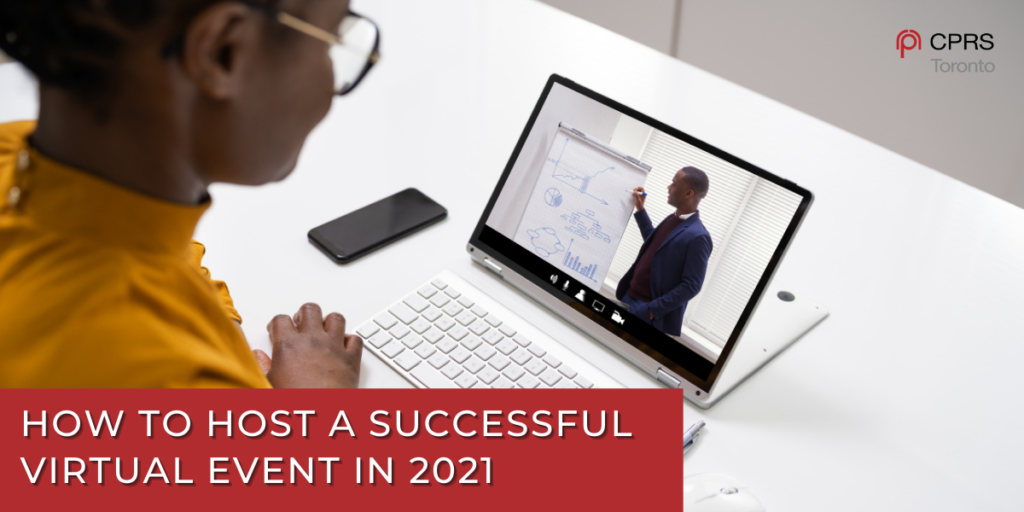Written by: Kaila Currie-Bartlett, public relations graduate, Event & Project Specialist, Fluid
The COVID-19 pandemic has brought significant changes to the live event industry. From cancelled events to our new normal, virtual events, organizations have had to strategically pivot to execute gatherings entirely online, while still meeting the needs of their attendees.
Since March, many organizations have embraced the virtual world as we’ve seen numerous creative alternatives surface. For example, organizers of some of the largest conferences, festivals and concerts have all found new ways to safely host events online while reaching their target audiences. Some organizations have even mentioned maintaining a virtual component to their events moving forward.
While live events remain on hold indefinitely and virtual events become the new norm, you may find yourself asking how can you ensure your event is successful? As an event host, how can you overcome Zoom fatigue in a time where many people are craving in-person event energy? How do you stay top of mind in a market that is rapidly evolving?
In my role as an Event and Project Specialist at Fluid, I have hosted three large virtual events in the form of a gala, educational webinar and corporate holiday party. Keep reading to learn how you can host a successful virtual event in 2021.
1. Hire an event producer and/or advisor (when budget allows)
Many people feel that an event producer is no longer required when hosting a virtual event. People tend to treat the new virtual format as a creative Zoom meeting and fail to see the technical requirements (managing breakout rooms, video transitions, live and pre-recording content, show flow, etc.) associated with hosting a successful and engaging event.
By hiring an event producer and/or advisor you are bringing an experienced professional onboard who can provide you with the ins and outs of hosting a successful virtual event. This expert can also provide support in creating an appropriate show flow, manage the recorded and live content, as well as help everyone navigate this new world.
2. Be strategic with your event time and date
You are no longer just competing with a booked date in someone’s calendar. You are now competing with the everyday demands of attendees working and living at home. One of the biggest challenges with virtual events is getting someone back online after work, giving their full attention.
According to findings from the Event Leadership Institute and Intrado, the average view time of a 60 minute webcast event is 31 minutes and a large percentage of attendees are more likely to tune into an event during the week as opposed to on the weekend. Although this is a major shift for the events industry, the two above findings are crucial to consider when planning your next online event.
Although we are moving to shorter programing, one of the biggest advantages of a virtual event is the ability to broaden your reach to a completely new audience. You no longer have to consider only reaching those in close proximity to your venue. Instead, it’s time to consider increasing your event footprint and potentially expanding your event nationally or even internationally. With that being said, in order to take advantage of this, you must be mindful during the planning stages and consider other time zones. If this is not possible, consider making the event accessible post-event either on your company website or your social channels.
3. When possible, pre-record your content
We all know what it’s like to experience technical troubles, whether it’s poor internet connection or sound drop off. Although these troubles are typically beyond our control in the virtual world, it’s important event planners take advantage of what they can, specifically, pre-recorded content.
There are several benefits in pre-recording your program’s content including full control over message delivery, little chance of going off script and most importantly, the ability to deliver your message more concisely.
With the average view time being only 31 minutes, pre-recording your content will allow you to keep to a tight show flow and ensure messages are delivered when the audience is most engaged. While it’s important to control your messaging with pre-recorded content, it’s equally important to have a host or facilitator who is live to keep the feel of an actual event and to keep the show moving forward.
4. Engagement and interaction remain at the heart of your success
No one wants to attend an event with just a bunch of talking heads. Now more than ever, attendees are longing for opportunities to engage and interact in safe but creative ways.
Fortunately since COVID-19 hit, virtual platforms have taken the industry by storm and continue to evolve almost every day with new engagement opportunities. Some creative strategies I have implemented are breakout rooms as ‘tables’ for cocktail hours or as speed networking sessions, polling, live question and answer periods, as well as social media walls.
In addition, to ensure your event meets the wants of your audience, I recommend creating your programming around the three F’s – fast (short, more concise programing), fresh and fun, in order to distinguish itself from an everyday Zoom meeting.
5. Get creative with your value-adds
Prior to COVID-19, attending the live event was the draw. Today and moving forward, much more thought has to go into value-adds to guarantee your attendees are tuning in and that the standards of your event are being met.
People are not looking for a box of miscellaneous swag. Instead, it is better to strategically consider the items going inside your box by connecting it to the program and/or organization, using the items inside as a tool for social sharing and a way to connect with your audience. A few creative suggestions include meal boxes, cocktail kits and event boxes delivered directly to attendees homes. Food vouchers are also an easier alternative and a great way to support local businesses.
As we can see, despite having to navigate restrictions on gatherings and attendees comfortability, there are still many ways to host successful events and stay connected with our target audiences. CRPS Toronto hosts a wide range of events for its members on an annual basis. Learn more about the events hosted in 2020 including the Student Steering Committee’s Virtual Coffee Chat and Fake News: Understanding the facts. Stay tuned for details surrounding our full lineup of virtual events happening in 2021.

